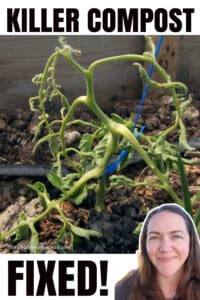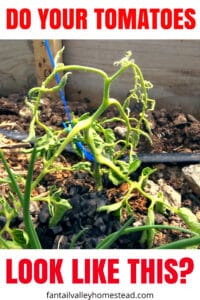Before we bought our new farm the whole place had been sprayed with persistent herbicides. This has meant that our soil has really struggled to grow plants well.
How do we end up with contaminated soil from persistent herbicides?
Persistent herbicides can make their way into your soil in many ways:
Please read: This information is provided for educational purposes only and is not intended to treat, diagnose or prevent any disease. We encourage you to make your own health care decisions in partnership with a qualified health care professional.
This post contains affiliate links, this means at no extra cost to you, we make a commission from sales. Please read
our Disclosure Statement
- Previous spray of plants on your land
- Overspray or spray drift from neighboring properties
- Contaminated compost materials
- Contaminated manure
What is persistent herbicide?
Persistent herbicides are known by many names, both product types, chemical families and by slang terms. Commonly known brands that include persistent broad leaf sprays (which are the ones causing the biggest issues in people’s backyards) are Grazon and Tordon X. There are lots of other brands that use the chemical families that cause issues in the garden.
There are four known persistent herbicides: Clopyralid, Aminopyralid, Aminocyclopyrachlor, and Picloram. There are more than 150 retail products worldwide that contain these, but the chemicals may appear on labels in slightly different variations making identification very difficult.
Broadleaf herbicides are commonly used to kill broadleaf weeds that grow among grass crops such as lawn, corn, wheat, barley, pasture grasses, or hay. Grassy crops are not affected by broad-leaf herbicides because of their hormone and metabolic systems. And the fact that they are grown on grasses that animals eat or are used in bulk composting facilities is often how it ends up in your garden.
What plants are sensitive to persistent herbicides?
Plant families sensitive to persistent herbicides include:
- Legumes – peas, beans, lentils, and clover
- Nightshades – tomatoes, eggplant and potatoes
- Daisy family – sunflower, petunias, daisies, lettuce, and asters
- Cucurbits – cucumber, squash, pumpkin, and watermelon
Legumes and nightshades seems to be most drastically affected.
What do plants damaged with these herbicides look like?
Plants effected by persistent herbicides may show on or more of the following symptoms:
- Failure to germinate/emerge from the soil
- Stunted growth long stalks and few leaves
- Reduced fruit set
- Cupping and twisting of leaves
- Failure of secondary leaves to grow after the seed leaves emerge
- In legumes, compound leaves stay single
How did I end up with persistent herbicide contaminated gardens?
The most common sources of herbicide in the garden are:
- Contaminated compost – usually manure based, mushroom compost being a common culprit
- Contaminated bagged potting soil – many producers use dumped green waste, manures or straw
- Contaminated manure – any animal manure that come from something that eats hay or grain can be an issue. Check what was sprayed on their food
- Contaminated mulch – straw or grass is often sprayed
What can I do to remove herbicide contamination from my garden?
These persistent herbicides are not broken down easily, in fact the only two options seem to be letting soil bacteria break them down or using organic matter to bind them up. Most are not even destroyed by fire!
You can of course dig out all the contamination and replace the soil, but this is a huge job! Precious plants can be carefully lifted, wash their roots carefully but thoroughly and replant into healthy soil
- Add lots of biochar to your soil – this can help bind the free chemicals so they cant effect your plants
- Spread the contamination out, it seems counter intuitive, but it needs direct contact with soil microbes to break down, a big pile will take much longer.
- Keep the area moist, water will both help dilute the chemicals and help keep the biology active
- Treat heavily with humic and fulvic acids – this supercharges the soil biology while also adding additional carbon to the soil. We use a powdered product, make it up to the recommended strength and watered it in heavily once a week for 8 weeks then regularly for 6 months
- Grow an unaffected crop – we found oats and corn both worked well.
After doing this for a growing season we found that sensitive plants could grow again successfully.
How to check for herbicide contamination
You need to do what is known as a bio-assay. Using some of the product in question vs a clean soil as a control grow some fast growing susceptible seeds eg beans. See this post for full details on how to do this.




